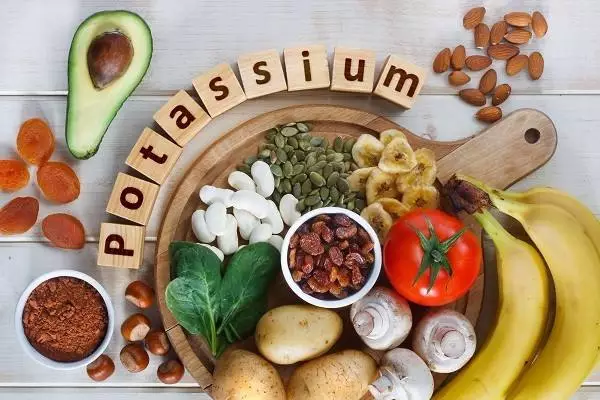 Potassium is the most important electrolyte in the body, serving a slightly different role than vitamins or other nutrients. It doesn’t provide energy, it isn’t a building material – but it conditions proper functioning of the most important systems – the circulatory and nervous ones.
Potassium is the most important electrolyte in the body, serving a slightly different role than vitamins or other nutrients. It doesn’t provide energy, it isn’t a building material – but it conditions proper functioning of the most important systems – the circulatory and nervous ones.
This particular element has a direct impact on the neuromuscular conduction, and every inadequacy in terms of the potassium content in the body results in disordered functioning of the heart and weakened strength of the skeletal muscles. On top of that, potassium normalizes blood pressure and the body’s pH, regulates fluid balance and insulin synthesis in the pancreas. Which means it has an indirect impact on the blood glucose level.
Potassium is popular to use as a supplement – in order to support the functioning of skeletal muscles and heart, over the course of a hypertension treatment that utilizes diuretics, or as a support during intense workouts. It is a completely justified approach – our diet usually provides much less potassium than the daily requirement is. There are only few exceptions when supplementing it should be conducted under a strict medical supervision. How much potassium a day do we need? What is the recommended daily dosage?
The daily potassium requirement is about 4700 mg for an adult. Such amount ensures maintaining the physiological concentration of potassium in blood which is 3,5 – 5,5 mmol/l. Of course that’s the amount of potassium determined for a healthy person. There is an array of factors, though, that increase the potassium requirement. We’re especially talking about excessive loss of potassium in the body through the skin and the urinary and gastrointestinal systems.
In most cases, those at risk of potassium deficiency are people who:
– do intense sports and are at risk of losing potassium through sweat
– stay in high temperatures that contribute to sweating
– take diuretics or laxatives
– suffer from vomiting or diarrhea
– consume plenty of sodium (especially contained in salt)
An increased potassium requirement can also be seen in pregnant women and those who have already had a potassium deficiency.
The symptoms of a low potassium level that should encourage to increase its supply in the diet and through supplementation are:
– hypertension
– cardiac arrhythmia
– weakened bones and muscles
– increased thirst
– excreting large amounts of urine
– constipations
Is the diet enough to provide an adequate dose of potassium?
How much potassium is in our diet? In most cases, it is half our daily requirement for this element on average. On top of that, our modern diet is characterized by high content of sodium that is provided with salt – which makes it necessary to provide even more potassium. Where to look for this element, then? Big doses of potassium can be found in cocoa – its content is almost 2000 mg/100 g.
Other valuable sources of potassium in the diet are:
– dried apricots (over 1600 mg)
– navy bean (almost 1200 mg)
– tomato concentrate (almost 1100 mg)
– pumpkin seeds (over 800 mg)
Potassium can also be found in nuts and seeds, in poppy or vegetables: potatoes, parsley leaves, tomatoes. Among fruits with high potassium content are avocado, bananas and apricots. And by taking a diet supplement containing potassium, you can also get about about few hundred extra mg of potassium. Such dosage provides the adequate amount of this element that effectively prevents potassium deficiency and its consequences.
Can potassium supplementation lead to overdosing this element? It shouldn’t – if we use the supplement at the recommended dosage and don’t suffer from a serious kidney disease. The potential potassium surpluses will get effectively excreted with urine, not leading to a potassium overdose. Which means there is no clearly defined maximum dose of potassium that can be provided daily – its level in the body is influenced by the potassium supply together with the diet and the supplements and kidneys’ capacity and the amount of potassium lost in the body. It is recommended, however, not to exceed a daily dose of about 7800 mg of potassium.
The standard dosage of around few hundred milligrams plus the potassium supply in the diet should not lead to a potassium overdose. Some caution should only be exercised by those whose kidneys don’t work properly. In such case, the excretion of excess potassium with urine might get disrupted and lead to accumulation of this element in the body. Another factor that contributes to an increased concentration of potassium is taking diuretics. In such case it is the best to get periodically tested for the potassium level in blood. It will help prevent the consequences of an excessive potassium level: heart disorders, seizures, apathy and fatigue or muscle paralysis. These are pretty rare cases, though.
Dietetyk i certyfikowany ekspert żywienia i ketozy. Zwolenniczka zdrowego stylu życia i zdrowej diety, propagatorka trendu clean label, praktyk diety ketogenicznej i postu przerywanego. W pracy i życiu prywatnym stawia na brak kompromisów – sięga wyłącznie po produkty i suplementy diety najwyższej jakości.
You must be logged in to post a comment.
Visitor Rating: 5 Stars